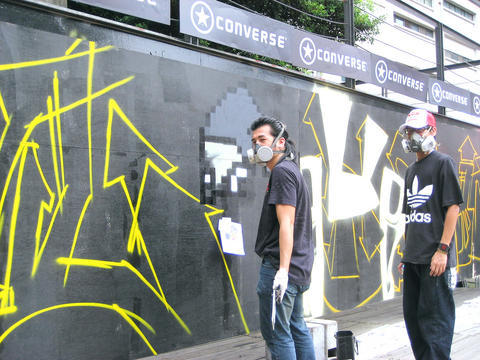For graffiti artists Ano and Bounce, there are two major challenges involved in producing graffiti in Taipei: finding the right location and avoiding detection long enough to finish the job.
A highly visible spot, such as a wall next to an MRT station, is a perfect location for street art. But in such a busy place, it is hard to spend several hours working on a piece without attracting the attention of the police.
"We like to express ourselves and communicate through graffiti, but the city punishes us for presenting our works in an unconventional location and manner," Ano, who has been a graffiti artist for six years and whose works can be found on many street corners in Taipei, told the Taipei Times.

PHOTO COURTESY OF TAIPEI CITY'S CULTURAL AFFAIRS DEPARTMENT
As a relatively young art form in Taiwan, graffiti is often dismissed as vandalism. Although the Taipei City Government softened its stance somewhat in 2005, when it made three of the retaining walls at Dachia Ying Feng Riverside available to graffiti artists, most artists still work in out-of-the-way places to avoid the police.
Things took a turn for the worse last year, when the city's Department of Environmental Protection established an around-the-clock hotline and cash rewards for those who report graffiti.
Graffiti artists face fines of between NT$1,200 and NT$6,000 for violating Article 27 of the Waste Disposal Act (
This lack of freedom frustrates Bounce and Ano, who declined to give their real names.
"We are not bad kids and we take graffiti as an art form very seriously. We don't write four-letter words or paint horrible images," Bounce said.
The duo try to avoid stereotypical "dirty," gloomy or creepy grafitti in favor of "cute" pieces with bright, warm colors and positive messages.
Bounce centers his pieces around a blind rabbit that loves music -- the character from which he takes his nickname.
Ano, meanwhile, creates graffiti mosaics.
"We do graffiti to make the city more beautiful and lively," Bounce said.
In a rare gesture of reconciliation, the city's Department of Cultural Affairs announced on Saturday that the fences around major public construction sites would be made available to graffiti artists.
"We will promote graffiti starting with the public sector, and then later in the private sector too. It's our goal to beautify the city with graffiti," department head Lee Yong-ping (
The department said it was also cooperating with the city's Water Conservancy Agency to open more of the walls at municipal riverside parks to graffiti artists, while working with the Taiwan Youth Rights and Welfare Advocacy Alliance to hold graffiti contests and festivals to promote the street art.
Bounce and Ano welcomed the news, but urged the city government to provide more locations closer to downtown and with convenient transportation.
"The spaces at riverside parks are so remote that I don't even know where those walls are," Ano said.
"People think graffiti artists like to paint on dark and abandoned walls or buildings, but the truth is we are afraid of those places. We'd love to do our art in a bright and safe environment," he said.
Having spent years sneaking around the city in search of the perfect canvas, Bounce and Ano hope that they will soon be able to share their creativity more openly.

Chinese spouse and influencer Guan Guan’s (關關) residency permit has been revoked for repeatedly posting pro-China videos that threaten national security, the National Immigration Agency confirmed today. Guan Guan has said many controversial statements in her videos posted to Douyin (抖音), including “the red flag will soon be painted all over Taiwan” and “Taiwan is an inseparable part of China,” and expressing hope for expedited reunification. The agency last year received multiple reports alleging that Guan Guan had advocated for armed reunification. After verifying the reports, the agency last month issued a notice requiring her to appear and explain her actions. Guan

GIVE AND TAKE: Blood demand continues to rise each year, while fewer young donors are available due to the nation’s falling birthrate, a doctor said Blood donors can redeem points earned from donations to obtain limited edition Formosan black bear travel mugs, the Kaohsiung Blood Center said yesterday, as it announced a goal of stocking 20,000 units of blood prior to the Lunar New Year. The last month of the lunar year is National Blood Donation Month, when local centers seek to stockpile blood for use during the Lunar New Year holiday. The blood demand in southern Taiwan — including Tainan and Kaohsiung, as well as Chiayi, Pingtung, Penghu and Taitung counties — is about 2,000 units per day, the center said. The donation campaign aims to boost

The Kaohsiung Tourism Bureau audited six hotels in an effort to prevent price gouging ahead of Korean band BTS’ concert tour in the city scheduled for Nov. 19, 21 and 22 this year. The bureau on Friday said that the audits — conducted in response to allegations of unfair pricing posted on social media — found no wrongdoing. These establishments included the local branches of Chateau de Chine, Hotel Nikko, My Humble House, and Grand Hai Lai, it said, adding that the Consumer Protection Commission would have penalized price gougers had the accusations been substantiated. The bureau said the Tourism Development Act

The Central Weather Administration (CWA) said a magnitude 4.9 earthquake that struck off the coast of eastern Taiwan yesterday was an independent event and part of a stress-adjustment process. The earthquake occurred at 4:47pm, with its epicenter at sea about 45.4km south of Yilan County Hall at a depth of 5.9km, the CWA said. The quake's intensity, which gauges the actual effects of a temblor, was highest in several townships in Yilan and neighboring Hualien County, where it measured 4 on Taiwan's seven-tier intensity scale, the CWA said. Lin Po-yu (林柏佑), a division chief at the CWA's Seismological Center, told a news conference